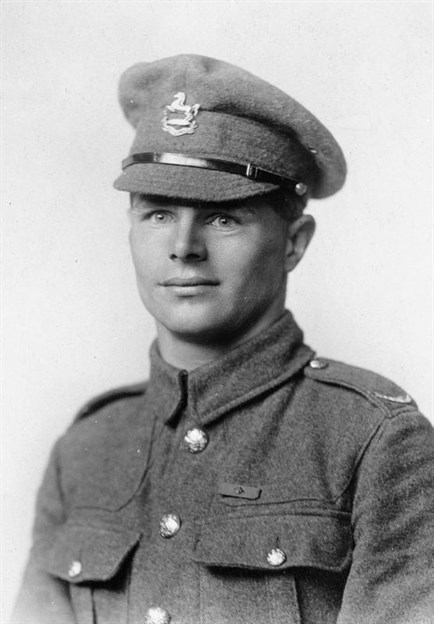
Jack Thomas Counter VC (3 November 1898 – 16 September 1970)
Jack Thomas Counter was born on the 3rd November, 1898 at Blandford, Dorset the son of Frank and Rosina Counter. One of three children, he was educated at Blandford National School and on leaving there became an employee of the International Stores a prominent business in the town. At the age of 17 he joined the Army in February 1917 and was posted to the 1st Battalion, The King's Liverpool Regiment and served with them in France.
He was 19 years old, and a private in the 1st Battalion, The King's (Liverpool) Regiment, British Army during the First World War when the following deed took place for which he was awarded the VC.
On 16 April 1918 near Boisieux St. Marc, France, it was necessary for information to be obtained from the front line and the only way to get it was over ground with no cover and in full view of the enemy. A small party tried without success, followed by six men, singly, each one being killed in the attempt. Private Counter then volunteered and, going out under terrific fire, got through and returned with vital information which enabled his commanding officer to organise and launch the final successful counter-attack. Subsequently he also carried five messages across the open under heavy artillery barrage to company headquarters.
Counter left the army in 1921 with the rank of corporal. His medal is on display at the Jersey Museum, Saint Helier.
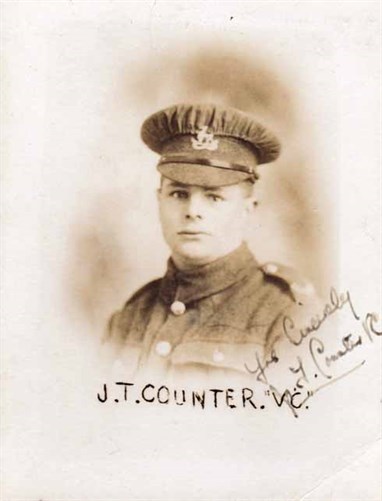
Private Jack Thomas Counter VC. Unit: 1st Battalion, The King's (Liverpool Regiment). Death: 16 September 1970.
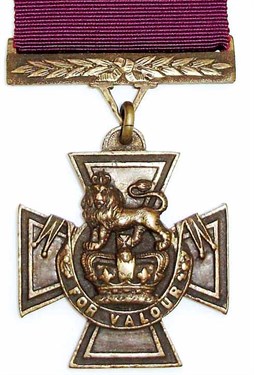
He was awarded the Victoria Cross during the German Spring Offensive on the Western Front for the following action: "On 16 April 1918 near Boisieux St. Marc, France, it was necessary for information to be obtained from the front line and the only way to get it was over ground with no cover and in full view of the enemy. A small party tried without success, followed by six men, singly, each one being killed in the attempt. Private Counter then volunteered and, going out under terrific fire, got through and returned with vital information which enabled his commanding officer to organise and launch the final successful counter-attack. Subsequently he also carried five messages across the open under heavy artillery barrage to company headquarters." Private Counter was born at Blandford Forum, Dorset in 1898. He survived the First World War and subsequently worked as a postman on Jersey in the Channel Islands. He died in 1970.
The 28th June, 1918 must have been a memorable one for 19 year old Private Jack Counter who had received his country's highest honour the Victoria Cross from King George V at Buckingham Palace. Returning to Blandford later in the day with his father they were welcomed by a guard of honour mounted by local Volunteers, the town band, borough officials and enthusiastic citizens at the railway station. After a short speech of welcome the local hero and his father were driven in an open landau to Blandford's Market Square where a platform had been erected in front of the municipal buildings for the purpose of an official reception.
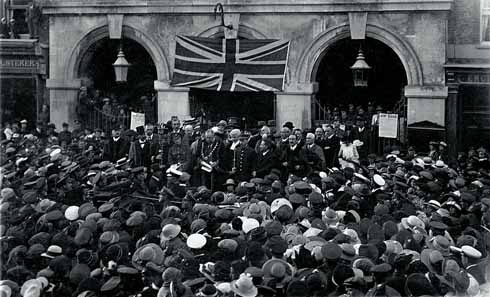
The Mayor, Alderman J. Lamperd expressed the town's pride in Private Counter's conspicuous exploits in France and read out the official citation. This was followed by a presentation of £100 in War Saving Certificates and a further honour was bestowed upon him as Jack Counter V.C., became the first Honorary Freeman of Blandford Forum. A gold watch and chain, suitably inscribed by his former employer the International Stores was also presented to him. The Mayor had received a letter from the chairman of the International Stores which he read out to cheering crowd of people in front of him: "We hear with very great pleasure of the honour that has been conferred upon Jack Counter, and we are pleased to join in the public testimonial that is being presented to him to commemorate his gallant deed. As prior to the war he was in the service of this company we desire to present him with the accompanying gold watch as recognition of his bravery and shall be very glad if you will be so good as to present it to him with our best wishes for the future."
Jack responded: "Mr Mayor and fellow citizens it is with great pleasure I receive the honorary freedom of my native town also the War Saving Certificates and the watch and chain. I may say that in what I was able to accomplish I was only doing my duty as a soldier of the King. I thank you one and all for your kindness to me this evening." After a lengthy applause and the playing of the National Anthem, the procession was reformed and Jack and his father were taken to their home in Dorset Street.
In March 1918 the Germans launched their Spring offensive on a 50 mile frontage opposite the British Third and Fifth Armies. Over the following days and weeks the Allies were forced to retire before the German onslaught giving up ground which had been fiercely fought over and hard won. The enemy briefly paused only to reorganise and bring fresh troops forward to replace casualties before launching further attacks.
The 1st Battalion, The King's Liverpool Regiment were part of the 6th Brigade, 2nd Division and the brigade had been deployed on the left of the British sector to the south of Arras. Trenches opposite the village of Boyelles and Boisleux St Marc were occupied by the 1st Battalion, The King's Liverpool Regiment. A sunken road ran between the two villages which provided good cover for the enemy in their approach to attack the battalion. During the morning of the 16th April the British front line was subjected to a heavy artillery barrage before it lifted onto the support and reserve positions. The shelling of the front line had caused heavy casualties amongst the 1st Battalion, The King's Liverpool Regiment and the Germans were able to penetrate their line in numerous places. In the chaos of battle Battalion Headquarters were unable to obtain up to date information about situation in the front line. To get reliable reports Headquarters had to send men down the sunken road and across a forward slope, over which the Germans had an open and clear view of any activity in front of them. Battalion HQ had sent a party of men and runners to attempt to traverse the sunken road and get across to the front line, but all had become casualties. Aware of the risk and the likelihood of death Private Jack Counter volunteered to try to get to the front line and bring back information.
The subsequent citation of the award of the Victoria Cross announced in the London Gazette of the 23rd May, 1918 describes his brave and courageous deed: "For most conspicuous gallantry and devotion to duty. It was necessary for information to be obtained from the front line in which the enemy had effected a lodgement. The only way was from the support line along a sunken road and thence down a forward slope for about 250 yards with no cover in full view of the enemy and swept by their machine-gun and rifle fire. After a small party had tried unsuccessfully (the leader having been killed another wounded before leaving the sunken road) it was thought that a single man had more chance of getting through.
This was attempted five times, but on each occasion the runner was killed in full view of the position from which he had started. Private Counter who was near his officer at the time and had seen the five runners killed one after the other then volunteered to carry the message. He went out under terrific fire and succeeded in getting through. He then returned carrying with him vital information with regard to the estimated number of enemy in our line, the exact position of our flank and the remaining strength of our troops. This information enabled his commanding officer to organise and launch the final counter-attack, which succeeded in regaining the whole of our position. Subsequently this man carried back messages across the open under a heavy artillery barrage to company headquarters. Private Counter's extraordinary courage in facing almost certain death, because he knew that it was vital that the message should be carried, produced a most excellent impression on his young and untried companions."
Jack Counter V.C., was promoted to Corporal and he is alleged to have said that he only accepted it to get out of 'spud bashing'. He survived the remaining months of the war and after the Armistice his regiment went to Jersey where he was demobilised in 1922. Deciding to make his home on the island he became employed as a postman at the St Ouen Post Office, working there for three years. In 1925 he was seconded to the Post Office at Sudbury Common, Middlesex, and returned four years later to Jersey.
Jack Counter was an active and life member of the British Legion having joined the Jersey branch in 1930. At Armistice and Legion parades he was the bearer on many occasions of the King's and Queen's standard. He met and married a local Jersey girl Ada Louise and lived in a house in Hansford Lane, First Tower. Subsequently they had one daughter, Pearl. Throughout the German occupation of the Channel Islands during the Second World War, Jack continued to work as a postman in St. Helier and was later awarded the Imperial Service Medal. On the 11th April, 1959 he retired aged 60 from the Post Office. However, he continued working firstly at G.D. Laurens and then for R. Le Ball & Company, both local businesses.
Described by his contemporaries as a quiet, unassuming man he was universally liked and respected. He attended numerous Victoria Cross functions including a garden party given by King George V at Buckingham Palace on the 26th June, 1920 for VC recipients; a VC Reunion Dinner held in the Royal Gallery of the House of Lords on the 9th November, 1929; the WWII Victory Day Celebrations at the Dorchester Hotel on the 8th June, 1946; the VC Centenary held in Hyde Park on the 26th June, 1956 and a garden party given by Queen Elizabeth II at Buckingham Palace on the 17th July, 1962.
In September 1970, Jack Counter was staying with his sister in Bristol. On the 17th they decided to have a day out to Blandford to visit the home of his sister-in-law. It was there during the afternoon he suddenly collapsed and died. He was 71 years of age. His wife had died in June and their daughter had pre-deceased both of them. Relatives, the Mayor of Blandford, Council officials, representatives of the Blandford and Jersey British Legion, the King's Liverpool Regiment and friends attended his funeral at Bournemouth Crematorium on the 24th September. His ashes were returned to Jersey and interred with his wife and daughter in St Andrew's Churchyard, First Tower, St. Helier.
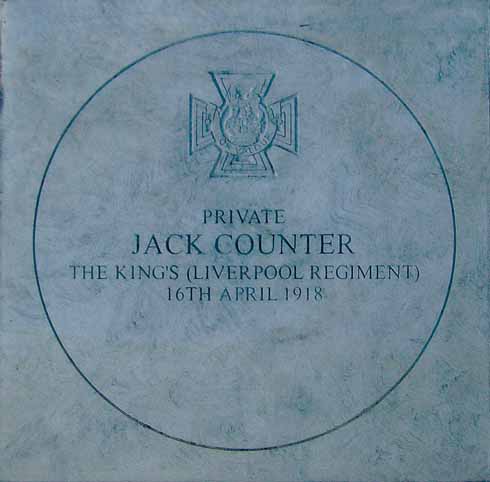
In 1971 The Jersey Post Office issued four stamps to commemorate the 50th Anniversary of the British Legion. A portrait of Jack Counter V.C. is depicted on the 7½p stamp. His name is inscribed on memorial plaques inside and outside St Andrews Church and a block of flats at St. Saviour's for the elderly was named 'Jack Counter Close'. A Blue Plaque was erected on the house in Dorset Street, Blandford where he had lived and a road in the town is also named after him.
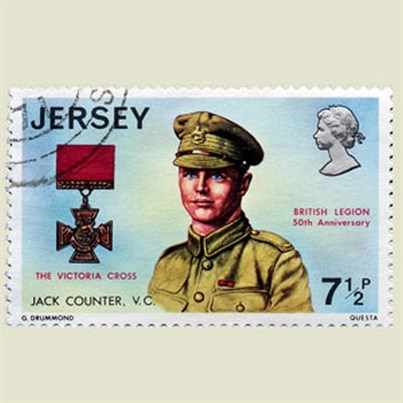
Jack Counter's Victoria Cross medal group consists of the Victoria Cross, British War Medal 1914-20, Victory Medal 1914-19, Imperial Service Medal (Elizabeth II), 1937 Coronation Medal and the 1953 Coronation Medal and were in the possession of a Canadian Medal collector. The group was put up for auction at a Glendening's sale on the 2nd March, 1989 with an estimate of £12,000-15,000. They were bought at the lower estimate by The Société Jersiaise and are on display in the Jersey Museum at St. Helier.